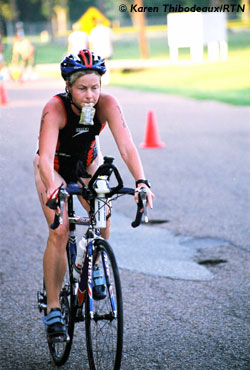 |
|  Sports Supplements: The winner's edge? September 1, 2002
by Nancy Clark, MS, RD This feature is a continuation of the Sports Psychology column
in the September 2002 issue of Runner Triathlete News. To read
the interview with triathlete champion Michellie Jones, pick up
a copy of the September issue of Runner Triathlete News.
Competitive athletes commonly take some type of sports
supplement to enhance health, performance or recovery from
injury. Yet questions arise: Is the supplement safe? Does it
work? This article looks at a few popular sports supplements and
separates hype from truth to help you make wise choices.
Supplements to Build Muscle
The safe and adequate amount of protein recommended by the
American College of Sports Medicine, American Dietetic
Association and the Dietitians of Canada is 0.5-0.6 gm
protein/lb for endurance athletes and 0.7-0.8 gms pro/lb for
strength athletes. Hence, the 200 lb. body builder who needs 140
to 160 grams protein/day can easily consume that amount via 1
quart milk (40 gms pro), a 6-oz. can of tuna (40 gm pro) and an
8 oz. chicken breast (65 gm pro). Plus, he'll get even more
protein from the other food in his diet. Consuming additional
protein from supplements is not only needless, but also costly
and displaces the carbs that are needed to provide fuel for the
hard, muscle-building workouts. Athletes who might benefit from protein supplements are
vegetarians who fail to consume adequate beans, tofu or other
sources of plant proteins. In this situation, consuming a
protein supplement is better than consuming no protein. Creatine: Popular among strength athletes and those who
do repeated bursts of brief, explosive exercise (weight lifting,
sprints, ice hockey), creatine is reputed to enhance recovery
from one bout to the next. Creatine rapidly re-energizes the
energy system that allows the muscles to do repeated bouts of
hard exercise. For example, some body builders report better
results from their workouts when they use creatine. By being
able to repeatedly lift heavy weights, they are able to
stimulate muscular growth. This translates into more strength,
power and body mass. But not all athletes respond to creatine;
some have little or no response. Athletes who choose to take creatine should know that larger
than recommended doses are needless; more is not better. They
should also drink extra water to guard against cramps. If you
are a parent who questions if your high school athlete can
safely take creatine, you'll be relieved to know the research
suggests creatine is safe. To date, creatine taken in the
recommended doses has not been linked with medical problems.
Yet, a wise motto with creatine (and any supplement) is "take at
your own risk" due to poor quality control in the supplement
industry. The psychological effects of taking creatine should not be
overlooked: Will the young athlete miss out on knowing how well
his "all natural" body responds to old-fashioned hard training?
This knowledge certainly builds self-esteem; lack of this
knowledge may leave a feeling of self-doubt. Hence, I recommend
young athletes reach their performance goals by training hard
(and wisely) and optimizing their sports diet (i.e., eating a
substantial breakfast and lunch to fully fuel themselves for a
hard afternoon workout). I discourage the use of creatine in
growing bodies.
Supplements for Endurance
Caffeine has the reputation of being a diuretic and contributing
to needless dehydration. According to Dr. Larry Armstrong of the
University of Connecticut, caffeine's diuretic effect is
insignificant -- particularly among regular coffee drinkers.
Caffeine may speed the rate of urination; you may urinate more
in 2 hours -- but not in 24 hours.
If you prefer to abstain from pre-exercise caffeine, a tried-and-
true route to enhance endurance and performance is to eat
appropriately before you workout. Research suggests athletes who
ate 400 calories for breakfast three hours prior to endurance
exercise exercised for 27 minutes longer than those who failed
to consume breakfast (136 vs 109 minutes). And if you will be
exercising more than 90 minutes, you can further enhance
endurance by consuming carbs (i.e., sports drink, gel) during
exercise.
Ephedra/Ma Huang: Ephedra (also called ma huang) is a
stimulant banned by the NCAA. Ephedra commonly appears in nasal
decongestants, cold medications and diet pills. It is also found
in Ripped Fuel, a supplement that is popularly to lose fat and
enhance energy. Ephedra in combination with caffeine and also aspirin are bad
combinations. Just go to the Center for Diseaes Control's
website: www.cdc.gov and check out the number of
medical problems and, yes, deaths associated with ephedra. In
general, athletes and non-athletes alike should certainly be
wary of products with ephedra and not take more than 24 mg.
ephedrine per day.
Conclusion: A smart sports diet can safely provide the
benefits sought from supplements. If you are looking for the
winning edge, consult with your local sports nutritionist (www.eatright.org provides a referral
network) or search the web (www.sportsci.org, www.gssiweb.com). For a compilation of in-
depth research from professional journals, go to www.oznet.ksu.edu/nutrition/supplements.htm.
You'll find a gold mine of information!
Nancy Clark, MS, RD, nutritionist at Boston-area's
SportsMedicine Associates, counsels individuals how to eat to
win. Her popular Nancy Clark's Sports Nutrition Guidebook,
Second Edition, is available by sending $23 to Sports Nutrition
Services, 830 Boylston St #205, Brookline MA 02467.
About Runner Triathlete News | About Running Network | Privacy Policy | Copyright | Contact Us | Advertise With Us |
|
|
 Is it safe for my 16 year old son to take creatine...?
Is it safe for my 16 year old son to take creatine...?